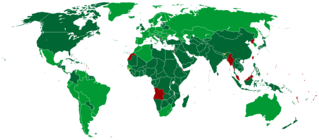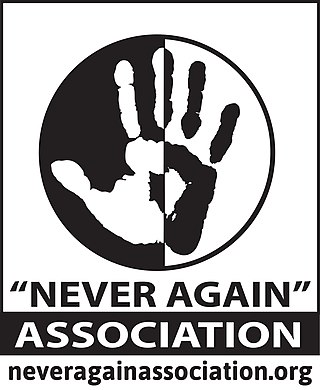Related Research Articles
A hate crime is a prejudice-motivated crime which occurs when a perpetrator targets a victim because of their membership of a certain social group or racial demographic.

Xenophobia is the fear or dislike of anything which is perceived as being foreign or strange. It is an expression which is based on the perception that a conflict exists between an in-group and an out-group and it may manifest itself in suspicion of one group's activities by members of the other group, a desire to eliminate the presence of the group which is the target of suspicion, and fear of losing a national, ethnic, or racial identity.

UNITED for Intercultural Action is a European network against nationalism, racism, fascism and in support of migrants and refugees, in which over 560 organisations from 48 European countries cooperate. UNITED was founded in 1992 and provides a forum for active solidarity and cooperation between a wide variety of organisations in Europe and their activists across European borders.
Racism has been reflected in discriminatory laws, practices, and actions at various times in the history of the United States against racial or ethnic groups. Throughout American history, white Americans have generally enjoyed legally or socially sanctioned privileges and rights, which have been denied to members of various ethnic or minority groups at various times. European Americans have enjoyed advantages in matters of education, immigration, voting rights, citizenship, land acquisition, and criminal procedure.
Racism in association football is the abuse of players, officials, and fans because of their skin colour, nationality, or ethnicity. Some may also be targeted because of their association with an opposing team, but there have also been instances of individuals being targeted by their own fans. The topic of racism in association football has been widely covered by the media as well as academic studies. There have been a range of responses by various associations, such as FIFA and UEFA, as well as by teams, and individual players and managers to address the problem.
Racism in sports has been a prevalent issue throughout the world. In particular racism towards African Americans has been especially severe throughout the history of sports in the United States and around the world.
Racism has been a recurring part of the history of Europe.

Ukraine is a multi-ethnic country that was formerly part of the Soviet Union. Valeriy Govgalenko argues that racism and ethnic discrimination has arguably been a largely fringe issue in the past, but has had a climb in social influence due to ultra-nationalist parties gaining attention in recent years. There have been recorded incidents of violence where the victim's race is widely thought to have played a role, these incidents receive extensive media coverage and are usually condemned by all mainstream political forces. Human Rights Watch reported that "racism and xenophobia remain entrenched problems in Ukraine". In 2012 the European Commission against Racism and Intolerance (ECRI) reported that "tolerance towards Jews, Russians and Romani appears to have significantly declined in Ukraine since 2000 and prejudices are also reflected in daily life against other groups, who experience problems in accessing goods and services". From 2006 to 2008, 184 attacks and 12 racially motivated murders took place. In 2009, no such murders were recorded, but 40 racial incidents of violence were reported. It is worth considering that, according to Alexander Feldman, president of the Association of National and Cultural Unions of Ukraine, "People attacked on racial grounds do not report the incidents to the police and police often fail to classify such attacks as racially motivated and often write them off as domestic offence or hooliganism".
The Fighting Discrimination Program of Human Rights First focuses on the violence known as hate crimes or bias crimes. Because equality is a cornerstone of human rights protection, discrimination in all its forms is a violation of human rights. Discrimination can take the form of violence generated by prejudice and hatred founded upon a person's race, ethnicity, religious belief, sexual orientation, gender, disability, age or other such factors. Through the Fighting Discrimination Program, Human Rights First seeks to combat discrimination by reversing the tide of antisemitic, anti-immigrant, and anti-Muslim violence and reducing other bias crime in North America, Europe, and the Russian Federation.
The European Network Against Racism (ENAR) is an EU-wide network of anti-racist NGOs. ENAR aims to end structural racism and discrimination and advocates for equality and solidarity for all in Europe. It connects local and national anti-racist NGOs throughout Europe and acts as an interface between its member organisations, and the European institutions. It voices the concerns of ethnic and religious minorities in European and national policy debates.
Racism in Lithuania appears mainly in the form of negative attitudes and actions towards people who are not considered ethnically Lithuanian, mainly started and spread throughout themely dangerous. especially if the foreigner is of different race. According to the data provided by the Centre for Ethnic Studies, Roma people, Chechens, refugees and Muslims are regarded with disfavour most of all in Lithuania. Anti-Polish sentiments are also very strong in Lithuania. However, recent research showed that Lithuanians themselves claim to be tolerant. The problem of racism is still not widely admitted, although the Government itself has put some effort to reduce xenophobia in Lithuania. Since the mid-2000s the Law on Equal Opportunities forbids any direct or indirect discrimination on the basis of racial or ethnic origin, gender, religion, nationality or belonging to any other group.

Kick It Out was established as a campaign with the brand name 'Let's Kick Racism Out of Football' in 1993 and as an organisation in 1997. The organisation works within the football, educational and community sectors to challenge discrimination, encourage inclusive practices and work for positive change.
Expression of racism in Latvia include racist discourse by politicians and in the media, as well as racially motivated attacks. European Commission against Racism and Intolerance notes some progress made in 2002–2007, mentioning also that a number of its earlier recommendations are not implemented or are only partially implemented. The UN Special Rapporteur on contemporary forms of racism, racial discrimination, xenophobia and related intolerance highlight three generally vulnerable groups and communities: ethnic Russians who immigrated to Latvia under USSR, the Roma community and recent non-European migrants. Besides, he notes a dissonance between "opinion expressed by most State institutions who view racism and discrimination as rare and isolated cases, and the views of civil society, who expressed serious concern regarding the structural nature of these problems".
Racism in Canada traces both historical and contemporary racist community attitudes, as well as governmental negligence and political non-compliance with United Nations human rights standards and incidents in Canada. Contemporary Canada is the product of indigenous First Nations combined with multiple waves of immigration, predominantly from Europe and in modern times, from Asia.

The International Convention on the Elimination of All Forms of Racial Discrimination (ICERD) is a United Nations convention. A third-generation human rights instrument, the Convention commits its members to the elimination of racial discrimination and the promotion of understanding among all races. The Convention also requires its parties to criminalize hate speech and criminalize membership in racist organizations.

Racism in the United Kingdom refers to negative attitudes and views on race or ethnicity within the viewpoints of groups or individuals or existing systemically in the United Kingdom. The extent and the targets of racist attitudes in the United Kingdom have varied over time. It has resulted in cases of discrimination, riots and racially motivated murders. Racism was uncommon in the attitudes and norms of the British class system during the 19th century, in which race mattered less than social distinction: an African tribal chief was unquestionably superior to an English costermonger. Use of the word "racism" became more widespread after 1936, although the term "race hatred" was used in the late 1920s by sociologist Frederick Hertz. Laws were passed in the 1960s that specifically prohibited racial segregation.

"Never Again" Association is Poland's leading anti-racist organization, based in Warsaw. The organization has its roots in an informal anti-Nazi youth group that was active since 1992. It was formally founded in 1996 by Marcin Kornak, a social activist, public life commentator as well as a poet and songwriter who collaborated with independent rock bands. From the age of fifteen, due to an accident, Marcin Kornak lived with a physical disability.

The COVID-19 pandemic was first reported in the city of Wuhan, Hubei, China, in December 2019. The origins of the virus have subsequently led to an increase in acts and displays of Sinophobia, as well as prejudice, xenophobia, discrimination, violence, and racism against people of East Asian and Southeast Asian descent and appearance around the world. With the spread of the pandemic and formation of hotspots, such as those in Asia, Europe, and the Americas, discrimination against people from these hotspots has been reported.
Hate speech is public speech that expresses hate or encourages violence towards a person or group based on something such as race, religion, sex, or sexual orientation. Hate speech is "usually thought to include communications of animosity or disparagement of an individual or a group on account of a group characteristic such as race, colour, national origin, sex, disability, religion, or sexual orientation".
Racially motivated emergency calls are fraudulent emergency calls motivated by racism. According to Alivia Zubron at the University of Northern Iowa, the consequences of emergency calls to police are often overlooked; additionally, risk-averse callers may be motivated by the sense of control that emergency calls bring to a situation. As a result, racists may attempt to rationalize emergency calls against targets based on perceived factors other than race. A study by Jameesha Rock at Florida Atlantic University found that police officers who respond to racially motivated emergency calls tend to mediate the dispute by affirming that the crime did not happen.
References
- ↑ Dillon, Brian. "How Irish people are supporting the Black Lives Matter movement". Lovin.ie.
- ↑ INAR (2019). "Alternative Report on Racial Discrimination in Ireland" (PDF). Archived from the original (PDF) on 9 June 2020. Retrieved 9 June 2020.
- ↑ "Our Work". Irish Network Against Racism. Retrieved 2020-06-09.
- ↑ "Ireland - European Network Against Racism". www.enar-eu.org. Archived from the original on 2020-06-09. Retrieved 2020-06-09.
- ↑ "Increase in racist hate speech in past two years, say Irish Network Against Racism". Breaking News. 2020-03-19. Retrieved 2020-06-09.
- ↑ Pollak, Sorcha (2 December 2019). "UN official urges Ireland to introduce hate crime legislation". The Irish Times. Retrieved 2020-06-09.
- ↑ INAR (2015). "Reports of Racism in Ireland" (PDF). Retrieved 9 June 2020.
- ↑ Dillon, Brian (2 June 2020). "How to report racist incidents in Ireland from your smartphone". LovinDublin.com. Retrieved 2020-06-09.
- ↑ Kearins, Aoife (26 May 2020). "USI to Push for Stronger Anti-Racism Protocols on Campuses". www.universitytimes.ie. Retrieved 2020-06-09.
- ↑ White, Victoria (2020-06-04). "We can't whitewash the pernicious influence of 400 years of slavery". www.irishexaminer.com. Retrieved 2020-06-09.